Major source material publication projects for premodern history
A bit of a change of pace here, but I thought I’d share a bit of the information I’ve gathered from working on cataloguing Korean books in the library here at SOAS. Of course if you are uninterested in premodern Korean history or have a low boredom threshold this would probably be a good time to click away.
I’ve posted before about accessing the major Chosŏn dynasty annals online. These have formed the backbone of studies on premodern Korean history during the last few decades, but now it seems the emphasis is moving toward more detailed research using archival sources. What I mean by archival sources are all the surviving public and private documents from the Chosŏn period that tend to be called komunsŏ (古文書) in Korean. These sources are becoming increasingly available to researchers through a number of massive compilation and publication projects being carried out by some of the main organisations in Korea responsible for promoting the study of Korean history: namely the Academy of Korean Studies (韓國學中央硏究院); the National History Compilation Committee (國史編纂委員會); the Kyujanggak library of Seoul National University (奎章閣); and the Korean Classics Research Institute (民族文化推進會).
Below I will look in turn at the collections that each of these institutions is publishing and what they offer for historians. If anyone knows of any important ones that I have missed out, please feel free to let me know in the comments.
>>Academy of Korean Studies:
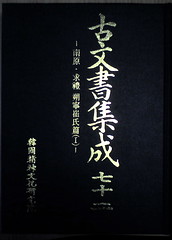
Komunsŏ chipsŏng 古文書集成 (76 vols)
A very impressive collection of archival materials, often from the archives of individual clans/families, now at volume 76 and counting. It includes mainly facsimiles of the originals but also some transcribed versions too.
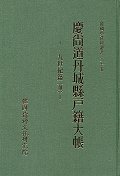
Han’gukhak charyo ch’ongsŏ 韓國學資料叢書 (36 vols)
Another very important collection which seems to have reached volume 36. The materials appear to be similar to those in the Komunsŏ chipsŏng collection but I think in this collection there is a greater preponderance of reprinted old books and diaries rather than komunsŏ as such. Among recent volumes are two covering the archives of the Pak family of Matjil village in Kyŏngsang province upon which the groundbreaking book ‘The Farmers of Matjil Village’ (맛질의농민들, 2001) was based.
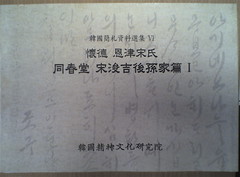
Hanguk kanch’al charyo sŏnjip 韓國簡札資料選集 (6 vols)
A series of volumes of collected letters including quite a lot written in han’gul (called ŏn’gan 諺簡) which could be very interesting for research into Chosŏn social history. Seems to have reached at least volume 6.
>>National History Compilation Committee:

Han’guk saryo ch’ongsŏ 韓國史料叢書 (47 vols)
This collection appears to be quite a diverse collection of historical documents, including many that are kept in collections outside of Korea. It turned out to be very useful for me as I discovered a whole new cache of documents relating to the topic of my thesis in one of the volumes dedicated to materials kept in Japan. It is also particularly great because most or all of these materials seem to be available online here.
>>Kyujanggak:
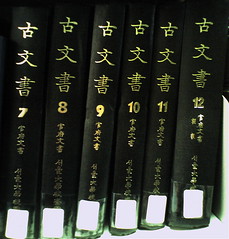
Komunsŏ 古文書 (29 vols)
Straightforwardly enough, this is a series of collections of komunsŏ from the Kyujanggak archives. As one might predict, considering this was once the royal library, about half of them consist of collections of government documents. You can find some more information about the contents of the volumes here.
Kyujanggak charyo ch’ongsŏ I & II 奎章閣資料叢書
Another couple of volumes of materials from the Kyujanggak archives.
>>Korean Classics Research Institute:
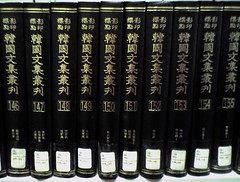
Han’guk munjip ch’onggan 韓國文集叢刊 (301 vols?)
I’m not sure whether this one really fits in this category, but it is certainly a publication mega-project that dwarfs the others, being a comprehensive collection of the collected works of Korean literati, or munjip. On the basis of the holdings in our library it seems to have reached volume 301, but it may have got further than that by now.
1 Comment